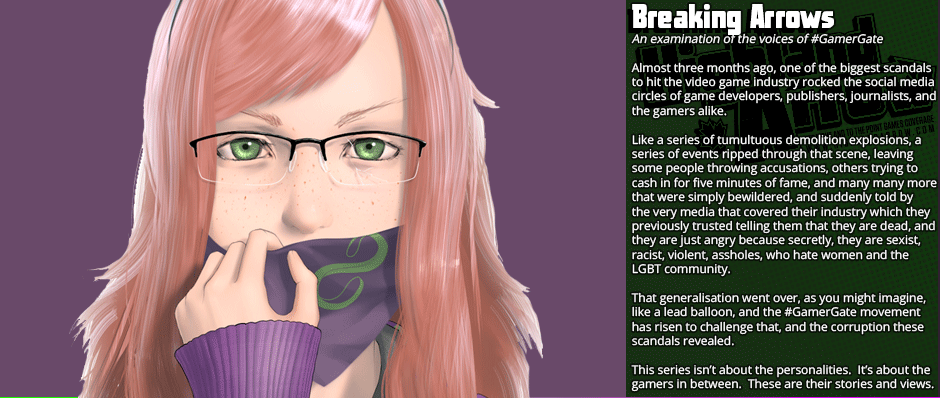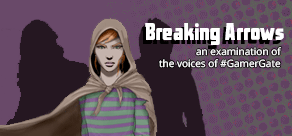Almost three months ago, one of the biggest scandals to hit the video game industry rocked the social media circles of game developers, publishers, journalists, and the gamers alike.
Like a series of tumultuous demolition explosions, a series of events ripped through that scene, leaving some people throwing accusations, others trying to cash in for five minutes of fame, and many many more that were simply bewildered, and suddenly told by the very media that covered their industry which they previously trusted telling them that they are dead, and they are just angry because secretly, they are sexist, racist, violent, assholes, who hate women and the LGBT community.
That generalisation went over, as you might imagine, like a lead balloon, and the #GamerGate movement has risen to challenge that, and the corruption these scandals revealed.
This series isn't about the personalities. It's about the gamers in between. These are their stories and views.

When I first raised the call to action about this idea of mine, this scratching at the back of my head to break silence and break ranks in some sense to report on GamerGate, I had the intention to try to examine the various facts, allegations, and weed out truth from fiction. It's a noble idea, and one I may yet apply to, but once I started talking to the many industry voices I know, and gamers that I know, one general sentiment was almost entirely constant: most of them felt they did not have a voice, and that either people weren't listening to them, or if they were, they were trying to use these people as pawns to further the various agendas at play in the scandal.
Why "Breaking Arrows"?
For those of you who aren't gamers, perhaps linked her by some of the good people involved, or those who have and simply haven't played the series, Breaking Arrows is the fourteenth mission of Ace Combat 4: Shattered Skies, whereby having destroyed then Stonehenge turret network super-weapon, the protagonist is called on to intercept salvos of cruise missiles sent from the missle battery Megalith in retaliation for the destruction of Stonehenge.
The parallels to the response of the mainstream games media are striking. The break of these scandals, the reveal of the corruption in the industry, and the withdrawal of Intel from advertising on one of the flagship publications, has had a series of smear campaign, involved personalities of female or minority status used as sacrificial lambs in the mainstream media to tar gamers such as on MSNBC, and a veritable tirade of complete and utter hatred given to gamers.
The objective of this series, of Breaking Arrows, is the same objective of that mission: to disarm those salvos as effectively as we can. We feel that humanising the small people involved, and giving them a voice, is a highly effective way to do just that.
Who is involved?
A list of the people who we've spoken to regarding this is maintained below, with additional people added as they contribute. Click their names to read their thoughts:
Do you want to participate? Please email pr at highlandarrow dot com or tweet at @highlandarrow. Please note we reserve the final right of publication. We aim to publish responses wholesale and unedited, so please keep things respectful and clean if you do respond.
What do we hope to accomplish?
From their very inception in the days of the Atari 2600 when video gaming made its first baby steps into anything approaching mainstream recognition, the people who enjoyed that hobby have endured ridicule, berating, and bullying because they chose that hobby. At first, it was strange and weird, not widely understood. Then it changed to violence in video games made them bad. Detractors, the people who didn't understand games and wanted to marginalise them, grasped for excuse after excuse to continue that oppression, until we come to the present day, and our own gaming media is telling us that these games make us hate women. Which is odd, I don't recall hating myself while playing video games. if anything they are my moment of power fantasy, and I always took a strange little pleasure in helping new players. I was a guide in UO for a long time when they existed,
Games can also unite. That's what they feared, i think, to at least some degree. Gaming brought together a bunch of weird people from all sorts of life. I documented my personal experiences here, if you haven't read that article,


